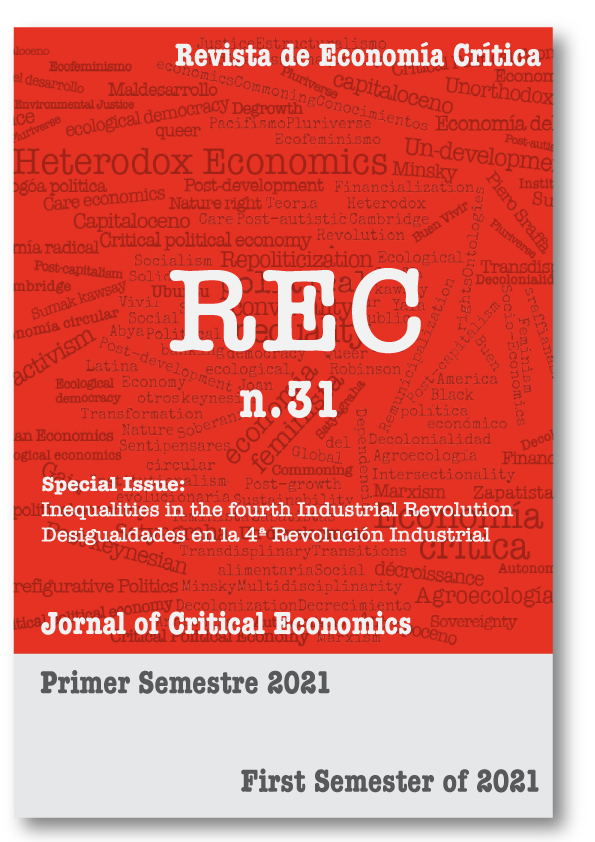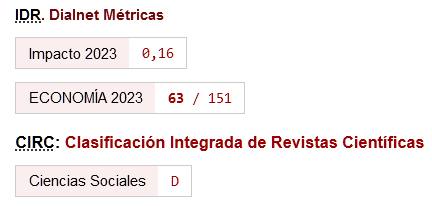Globalización y responsabilidad en los problemas ecológicos
DOI:
https://doi.org/10.46661/rec.10311Palabras clave:
Contabilidad desde la perspectiva del consumo, problemas ecológicos, huella de carbono, huella material, desplazamiento de carga ambientalResumen
La mayoría de las estadísticas, análisis y políticas sobre presiones ambientales adoptan una perspectiva territorial. De acuerdo con esta, las presiones ambientales se asignan al país (región o ciudad) en el que se generan. Sin embargo, la economía global se caracteriza por flujos masivos de mercancías entre diferentes territorios. Por ello, es también importante analizar las presiones ambientales causadas por las demandas internas de un país, independientemente de dónde estas tengan lugar. Esta perspectiva se conoce como perspectiva "basada en el consumo" y se relaciona con el concepto de huella ambiental. En este artículo se ven algunos ejemplos de esta doble perspectiva, tanto en un caso de un problema global, como es el de las emisiones de gases de efecto invernadero, como en otros indicadores ambientales de problemas más locales o regionales. Las importantes diferencias entre los indicadores obtenidos con ambas perspectivas refuerzan la necesidad de tener también en cuenta la perspectiva "basada en el consumo" para tener una mejor información de las diferentes responsabilidades en los diferentes problemas ambientales.
Descargas
Citas
Arto, I., Roca, J. y Serrano, M. (2014): "Measuring emissions avoided by international trade: accounting for price differences", Ecological Economics, 97(1), pp. 93–100. DOI: https://doi.org/10.1016/j.ecolecon.2013.11.005
Ayuntamiento de Barcelona (2018): "Objectiu 10: Resiliència i esponsabilitat planetària. Indicador 10.1. Canvi climàtic", disponible en: https://www.barcelona.cat/barcelonasostenible/sites/default/files/
Indicadors/Indicadors2018/web2018_ind10.1.pdf
Baranzini, A., van den Bergh, J., Carattini, S., Howarth, R., Padilla, E. y Roca, J. (2017): "Carbon pricing in climate policy: Seven reasons, complementary instruments, and political-economy considerations, WIREs DOI: https://doi.org/10.1002/wcc.462
Climate Change, 8(4), e462.
Bicknell. K.B, Ball, R.J., Cullen, R. y Bigsby, H.R. (1998): "New methodology for the ecological footprint with an application to the New Zealand economy", Ecological Economics, 27, pp. 149.160. DOI: https://doi.org/10.1016/S0921-8009(97)00136-5
Carpintero, Ó. (2005): El Metabolismo de la Economía Española: Recursos Naturales y Huella Ecológica (1955–2000). Fundación César Manrique, Lanzarote.
C40 Cities (2018): Consumption-based GHG Emissions of C40 Cities, March 2018. https://www.c40.org/researches/consumption-based-emissions
Davies, S. J. y Caldeira, K. (2010): "Consumption-based accounting of CO2 emissions", Proceedings of the National Academy of Sciences, 107(12), pp. 5687–5692. DOI: https://doi.org/10.1073/pnas.0906974107
Diffenbaugh, N.S. y Burke, M. (2019): "Global warming has increased global economic inequality", Proceedings of the National Academy of Sciences, 116 (20), 9808–9813. DOI: https://doi.org/10.1073/pnas.1816020116
EJAtlas - Global Atlas of Environmental Justice. https://ejatlas.org/
European Commission/Eurostat (2001): Economic-wide Material Flow Accounting and derived indicators. A methodological guide, Luxemburgo: Statistical Office of the European Union. https://ec.europa.eu/
eurostat/documents/1798247/6191533/3-Economy-wide-material-flow-accounts...-A-methodologicalguide-2001-edition.pdf/
Hertwich, E.G. y Peters, G.P. (2009): "Carbon footprint of nations: A global, trade-linked analysis", Environmental Science and Technology, 43(16), 6414–6420. DOI: https://doi.org/10.1021/es803496a
IEA (2014): Key Energy World Statistics. http://www.iea.org/publications/freepublications/publication/key-world-energy-statistics-2014.html.
IPCC (2014): Climate Change 2014: Synthesis Report. Contribution of Working Groups I, II and III to the Fifth Assessment Report of the Intergovernmental Panel on Climate Change. IPCC, Ginebra, Suiza.
Disponible en: http://www.ipcc.ch/report/ar5/syr/
Martínez Alier, J. (2004): "Los conflictos ecológico-distributivos y los indicadores de sustentabilidad", Revista Iberoamericana de Economía Ecológica, 1, pp. 21–30.
Martínez-Alier, J. y Roca Jusmet, J. (2013): Economía Ecológica y Política Ambiental. Tercera edición, Fondo de Cultura Económica, México.
Munksgaard, J. y Pedersen, K.A. (2001): "CO2 accounts for open economies: producer or consumer responsibility?, Energy Policy, 29(4), pp. 327–334. DOI: https://doi.org/10.1016/S0301-4215(00)00120-8
Muñoz, P., Giljum, S. y Roca, J. (2009): "The raw material equivalents of international trade: Empirical evidence for Latin America", Journal of Industrial Ecology, 13(6), pp. 881–897. DOI: https://doi.org/10.1111/j.1530-9290.2009.00154.x
Muradain, R. y Martínez–Alier, J. (2001): "Trade and the environment: from a 'Southern' perspective", Ecological Economics, 36(2), pp. 281–297. DOI: https://doi.org/10.1016/S0921-8009(00)00229-9
OCDE (2018): Indicators on Carbon dioxide (CO2) emissions embodied in international. Disponible en: https://stats.oecd.org/ (consultado el 20 de mayo de 2020)
Our World in Data (OWID) (2020): CO2 and greenhouse gas emissions. (Incluye el acceso a los datos en las figuras). Disponible en: https://ourworldindata.org/co2-and-other-greenhouse-gas-emissions (consultado el 9 de enero de 2021).
Peters, G.P. (2008): "From production–based to consumption–based national emission inventories", Ecological Economics, 65(1), pp. 13–23. DOI: https://doi.org/10.1016/j.ecolecon.2007.10.014
Peters, G.P. y Hertwich, E.G. (2008): "CO2 embodied in international trade with implications for global climate policy", Environmental Science and Technology, 42(5), pp. 1401–1407. DOI: https://doi.org/10.1021/es072023k
Proops, J.L.R., Faber, M. y Wagenhals, G. (1993): Reducing CO2 Emissions. Springer–Verlag, Berlin. DOI: https://doi.org/10.1007/978-3-642-77792-9
Roca, J. y Serrano, M. (2007): "Income growth and atmospheric pollution in Spain: an input–output approach", Ecological Economics, 63(1), pp. 230–242. DOI: https://doi.org/10.1016/j.ecolecon.2006.11.012
Roca Jusmet, J. (coord.), Alcántara, V., Arto, I., Padilla, E. y Serrano, M. (2013): La Responsabilidad de la Economía Española en el Calentamiento Global. Fuhem Ecosocial/ Los libros de la Catarata, Madrid.
Rocchi, P., Serrano, M., Roca, J., Arto, I. (2018): "Border carbon adjustments based on avoided emissions: Addressing the challenge of its design", Ecological Economics,145, 126–136. DOI: https://doi.org/10.1016/j.ecolecon.2017.08.003
Serrano, M. y Dietzenbacher, E. (2010): Responsibility and trade emission balances: An evaluation of approaches, Ecological Economics, 69(11), pp. 2224–2232. DOI: https://doi.org/10.1016/j.ecolecon.2010.06.008
Stern, N. (2006): Stern Review on the Economics of Climate Change. Cambridge University Press, Cambridge. DOI: https://doi.org/10.1017/CBO9780511817434
Tukker, A., de Koning, A., Owen, A., Lutter, S., Bruckner, M., Giljum, S., Stadler, K., Wood, R., Hoekstra, R. (2018): "Towards robust, authoritative assessments of environmental impacts embodied in trade", Journal DOI: https://doi.org/10.1111/jiec.12716
of Industrial Ecology, 22(3), pp. 585–598.
UN Environment (2020): UN Environment International Resource Panel. Environment Live / Global Material Flows Database. Disponible en: https://environmentlive.unep.org/downloader (consultado el 22 de junio
de 2020).
Wackernagel, M. y Rees, W. (1998): Our Ecological Footprint: Reducing Human Impact on the Earth. New Society Publishers, Gabriola Island.
Wiedmann, T. y Mix, J. (2008): "A definition of 'Carbon Footprint'", in C.C. Pertsova (ed.) Ecological Economics Research Trends, Nova Science Publishers, Nueva York.
Weidemann, B., Suh, S. y Notten, P. (2006): "Setting priorities within product–oriented environmental policy, the Danish perspectives", Journal of Industrial Ecology, 10(3), pp. 73–87. DOI: https://doi.org/10.1162/jiec.2006.10.3.73
Wiedmann, T.O., Schandl, H., Lenzen, M., Moran, D., Suh, S., West, J., Kanemoto, K. (2015): "The material footprint of nations", Proceedings of the National Academy of Sciences, 112 (20) 6271–6276. DOI: https://doi.org/10.1073/pnas.1220362110
Zhang, Q., Jiang, X., Tong, D., Davis, S.J., Zhao, H., Geng, G., Feng, T., Zeng, B., Lu, Z., Streets, D.G., Ni, R., Brauer, M., van Donkelaar, A., Martin, R., Huo, H., Liu, Z., Pan, D., Kan, H., Yan, Y., Lin, J., He., K., Guan,
D. (2017): "Transboundary health impacts of transported air pollution and international trade", Nature, 543, pp. 705–709. DOI: https://doi.org/10.1038/nature21712
Descargas
Publicado
Cómo citar
Número
Sección
Licencia
Derechos de autor 2021 Jordi Roca Jusmet, Emilio Padilla Rosa

Esta obra está bajo una licencia internacional Creative Commons Atribución 4.0.
Esta licencia permite a terceros compartir (copiar y redistribuir el material en cualquier medio o formato) y adaptar (remezclar, transformar y crear a partir del material para cualquier finalidad, incluso comercial), siempre que se reconozca la autoría y la primera publicación en esta revista (La Revista, DOI de la obra), se proporcione un enlace a la licencia y se indique si se han realizado cambios en la obra.







